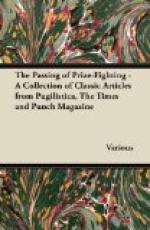[Illustration: SUPPLEMENTARY QUESTIONS ON THE CLOTHING DIFFICULTY.
MR. G.R. THORNE TO ASK MR. MALLABY-DEELEY (CONTROLLER OF SUITINGS) WHAT IS THE PRICE OF HIS LATEST CUT.
LT.-COL. WILL THORNE TO ASK WHETHER ANY REDUCTION IS MADE IN PROPORTION TO QUANTITY OF CLOTH PURCHASED.]
I understand that Mr. MALLABY-DEELEY disclaims being the customer to whom the Disposals Board sold 577,000 suits of Government clothing. He makes a point of never being over-dressed.
A suggestion that in view of the difficulty of filling diplomatic vacancies the Government should appoint suitable women to some of these posts was declined by the PRIME MINISTER on the ground that it was not practicable at present. I doubt if he would have had the hardihood to make this avowal but that Lady ASTOR had been ousted from her usual seat by Mr. PEMBERTON BILLING.
Tuesday, March 2nd.—Lieut.-Commander KENWORTHY might be described as a pacificist who conducts a persistent offensive. He accused the WAR MINISTER of having made a false statement about Conscription in America, and later on made an allusion to General DENIKIN which Mr. CHURCHILL, to the satisfaction of the House, which does not exactly love the Central Hullaballoonist, described as “a singularly ill-conditioned sneer.”
Lord WINTERTON, once the “baby” of the House, is still one of its most popular figures. Members were quite interested as he proceeded to explain, with an engaging blush, that a “hard case” which he had brought to the notice of the WAR MINISTER was his own, and sorry when the SPEAKER brought the narrative to a sudden stop by observing, “This is not the moment for autobiography.”
The FIRST COMMISSIONER OF WORKS was roundly abused for having spent L3,250 on tapestry for Hampton Court Palace. But when it turned out that the panel in question was the long-missing number of a set belonging to Cardinal WOLSEY, and that its recovery was largely due to the enterprise and munificence of the right hon. gentleman himself, the House agreed that his completion of “Seven Deadly Sins” was a venial offence.
[Illustration: THE HULLABALLOONIST.
LIEUT.-COMMANDER KENWORTHY.]
Other Estimates evoked more healthy criticism. Sir FREDERICK BANBURY was eloquent upon what he called a “hotel for gardeners” at Kew. Mr. HOGGE was for rooting up the Royal Botanical Gardens, since they were hardly ever visited by Scotsmen, and Captain STANLEY WILSON inveighed against the extravagance with which the British delegates were housed in Paris. Sir ALFRED MOND admitted that they “did themselves very well,” but pleaded that they could hardly be expected to go to Montmartre—at least not collectively—and pointed out that some of the criticisms should be addressed to other Departments. He was not responsible, for example, for “clothes of typists.”
Wednesday, March 3rd.—Among the things that they do better in France, according to Lord SUDELEY, is the popularisation of picture-galleries and museums. He instanced the pictures on French match-boxes. But were they always confined to reproductions of Louvre masterpieces? My recollection is that at one time they took a wider range and were distinctly more striking than the matches.




